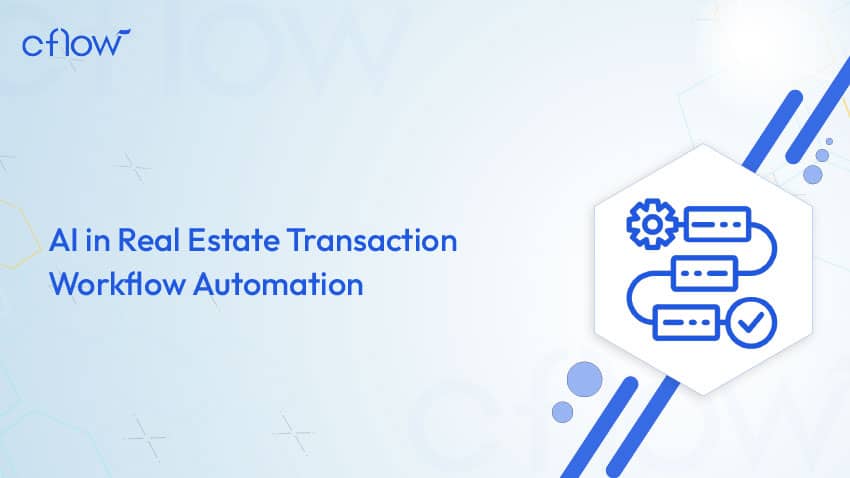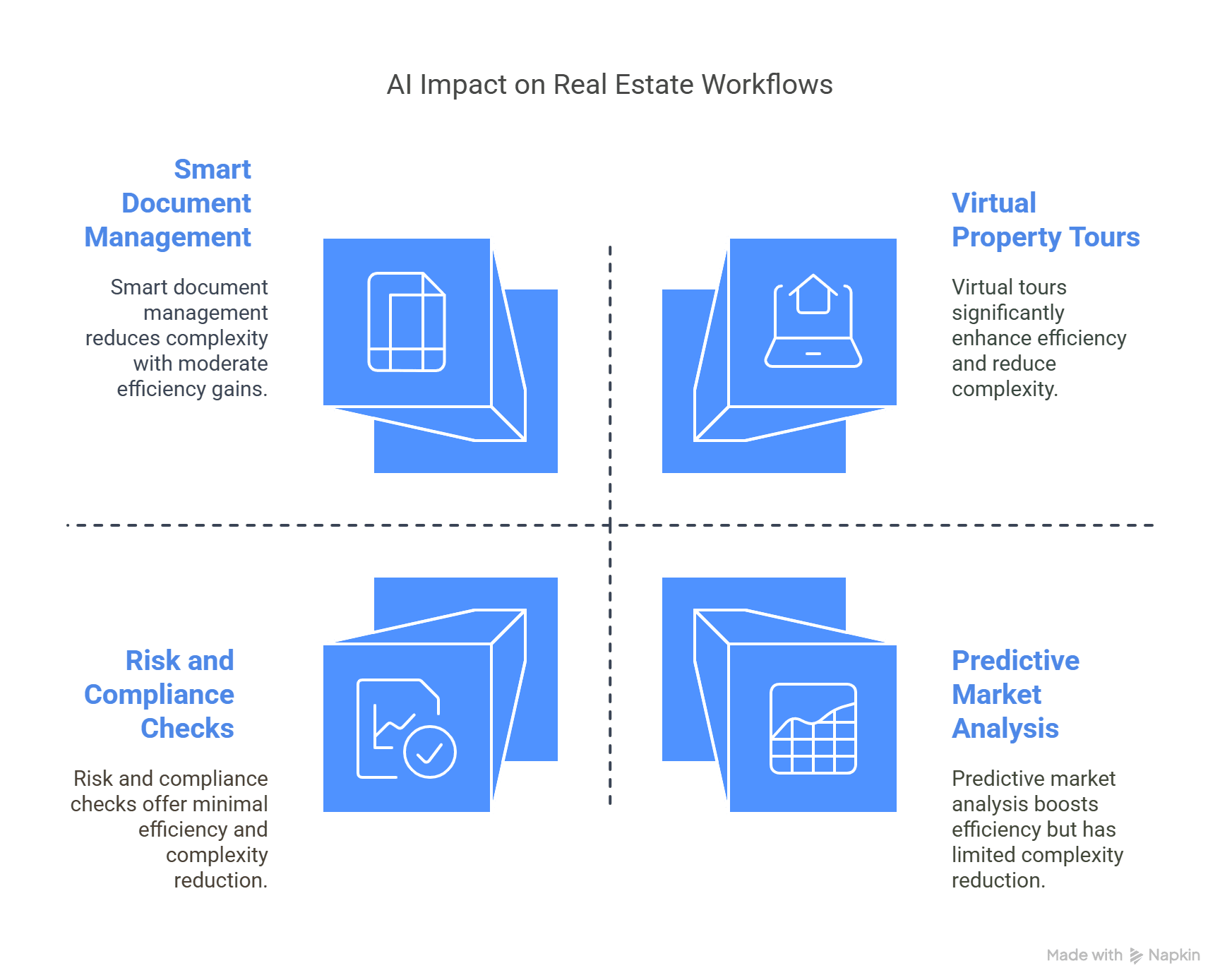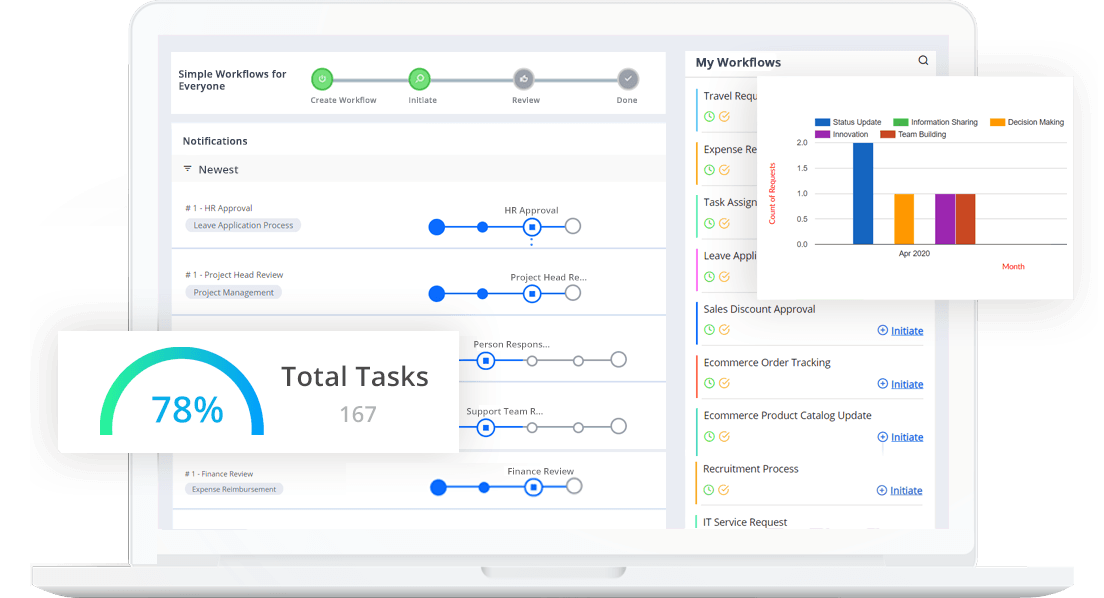AI in Real Estate Transaction Workflow Automation

Key takeaways
- AI automation streamlines real estate transactions by automating document processing, enhancing property valuations, and improving client interactions.
- AI in property transaction automation enhances operational efficiency and client satisfaction while supporting long-term growth for agents and investors.
- AI-driven tools reduce manual errors, accelerate deal closures, and provide predictive insights for better decision-making.
- Platforms like Cflow offer no-code AI solutions, enabling real estate professionals to automate workflows without extensive IT resources.
According to studies, in 2025, AI is transitioning from a tactical tool to a strategic priority in the real estate sector, with increased confidence in its accuracy and the development of user-friendly platforms. The real estate industry, traditionally known for manual processes and paperwork-heavy workflows, is now on the brink of major transformation.
Artificial Intelligence (AI) is automating repetitive, time-consuming tasks, streamlining complex processes, and improving client engagement. Real estate transaction workflows, from property listings and valuations to legal checks and closings, are being reshaped through smart automation.
As housing markets become more competitive and customer expectations grow, AI in real estate transaction workflow automation is enabling agents, investors, and firms to work smarter, close deals faster, and deliver better customer experiences.
The UK’s AI market is valued at over £21 billion and is expected to grow significantly, reaching £1 trillion in the coming years.
In this blog, we explore how AI is revolutionising property transactions and how real estate professionals can harness it to stay ahead.
What is AI Workflow Automation in Real Estate Transactions?
AI workflow automation in real estate refers to the integration of machine learning and data-driven intelligence into real estate workflows. It allows professionals to automate decision-making and streamline repetitive tasks while improving precision and consistency. These systems go beyond pre-programmed rules—they adapt, learn from historical and current data, and optimise performance continuously.
Core applications of AI automation include:
- Document Automation: AI scans, classifies, and extracts information from legal paperwork such as title deeds, contracts, and lease documents, dramatically reducing manual review time.
- Property Valuation: Machine learning evaluates variables like market demand, location, past transaction history, and property characteristics to provide data-backed, dynamic pricing models.
- Lead Qualification & Client Interaction: AI chatbots and CRM tools handle initial lead responses, qualify prospects, recommend listings, and schedule showings—all with minimal human input.
- Compliance & Risk Assessment: AI flags inconsistencies, missing documentation, or compliance issues in real estate filings, helping reduce risk during due diligence.
By digitising and accelerating these critical processes, AI automation empowers real estate professionals to focus on negotiation, relationship-building, and closing deals faster.
Why AI is Essential for Modern Real Estate Operations
Real estate transactions demand fast, data-backed decisions with minimal room for error. Clients want real-time updates, and market cycles require agents to respond swiftly. Traditional tools can’t keep up. AI solves this with scalable, intelligent support that enhances accuracy and productivity.
- Enhancing Efficiency: AI offloads tedious administrative tasks like paperwork processing, client follow-ups, and compliance checks, allowing professionals to concentrate on closing deals.
- Improving Accuracy: By automating data capture and validation, AI reduces human error, ensuring accurate property records, valuations, and communications.
- Providing Insights: AI analytics reveal patterns in buyer behaviour, regional market shifts, and pricing trends—helping agents develop smarter strategies.
With AI, professionals gain the operational edge they need to compete in a fast-paced, tech-forward industry. It augments their capabilities while enhancing client satisfaction.
Key Real Estate Workflows Enhanced by AI
AI is transforming the real estate workflow from end to end. By targeting high-friction tasks like document processing, client matching, and compliance checks, AI helps professionals optimise time and accuracy across the entire transaction lifecycle.
1. Smart Document Management
AI-powered document management systems extract relevant details from complex real estate documents and organise them for quick access. This not only accelerates workflow completion but also enhances audit readiness and compliance.
2. Predictive Market Analysis
AI enables data-driven forecasting of market trends, pricing shifts, and inventory fluctuations. By analysing years of housing data alongside current market variables, agents and investors can make better-timed investment decisions.
3. Automated Client Matching
AI studies a buyer’s interaction patterns, stated preferences, and prior browsing history to recommend listings with higher match potential. This reduces lead drop-off and improves buyer satisfaction.
4. Virtual Property Tours
AI-integrated VR platforms deliver immersive property experiences to clients, saving time on physical tours and expanding access to remote buyers. Some tools even use AI to adjust the tour experience based on viewer behaviour.
5. Risk and Compliance Checks
AI reviews title deeds, tax filings, and financial statements to highlight inconsistencies or red flags before closing. It ensures smoother due diligence, particularly for high-value commercial or cross-border transactions.
Benefits of AI-Driven Workflow Automation in Real Estate
The integration of AI into real estate operations is delivering measurable improvements. From operational cost savings to superior client service, AI workflow automation supports firms in scaling sustainably while staying ahead of the competition.
Reduced Costs: Automating low-value, repetitive processes cuts labour expenses and reduces the need for outsourcing.
Faster Transactions: AI reduces bottlenecks in processes such as approval cycles, client onboarding, and contract reviews, cutting weeks from deal timelines.
Improved Accuracy: Automated systems verify inputs and cross-check documentation, helping teams avoid errors that often lead to costly legal delays.
Stronger Customer Relationships: Personalised AI responses and follow-ups ensure that no inquiry is missed and that client needs are met promptly and professionally.
Scalable Operations: AI-powered workflows can scale seamlessly with growing transaction volumes, allowing firms to expand without significantly increasing overhead.
Real-World Examples of AI in Real Estate Transaction Workflow Automation
Below are real-world examples of how leading companies are leveraging AI to streamline property transactions, reduce delays, and enhance client experiences in the real estate industry.
1. Zillow – AI-Powered Property Valuation
Zillow’s “Zestimate” uses machine learning to generate real-time home valuations using historical property data, location features, market trends, and user-submitted information. This automated valuation model has become a trusted tool for buyers and sellers seeking fast, data-backed pricing insights.
2. Redfin – Predictive Client Matching
Redfin deploys AI algorithms to match homebuyers with listings that reflect their behaviour and preferences. Their recommendation engine learns from browsing habits, click-through rates, and inquiry data to personalise listings and improve user engagement.
3. JLL – Lease Abstraction with NLP
Jones Lang LaSalle (JLL) uses natural language processing (NLP) to automatically extract key terms from lease agreements across global portfolios. The AI system identifies clauses, payment schedules, and tenant obligations, dramatically reducing review time and legal costs.
4. Compass – Smart Workflow Tools
Compass real estate platform provides agents with AI-powered marketing and document automation tools. These features allow agents to generate contracts, track listing updates, and automate customer communications to close deals faster and more efficiently.
5. AskPorter – AI Assistant for Property Management
UK-based AskPorter uses an AI assistant to handle tenant queries, maintenance scheduling, and task routing for property managers. The platform reduces manual effort while maintaining personalised communication through natural language understanding.
How to Implement AI in Real Estate Transaction Workflow Automation
Implementing AI in real estate workflows requires a phased, strategic approach to ensure success, minimise disruption, and deliver long-term value.
Audit Existing Workflows: Begin by mapping current transaction processes—identify manual bottlenecks, redundant steps, and high-error areas such as document handling, valuation, or lead response.
Select the Right AI Tools: Choose platforms like Cflow that offer no-code interfaces, integration with CRM or property databases, and pre-built templates tailored to real estate workflows.
Start with a Pilot: Implement AI in a single high-impact area, such as automating client matching or digitising document verification. Monitor its impact and refine the workflow.
Train Staff and Ensure Buy-In: Educate team members about how AI will assist—not replace—their work. Provide training, clear use cases, and ongoing support.
Integrate and Scale Gradually: Once the pilot proves successful, expand AI across functions—compliance tracking, risk assessments, or automated communications—ensuring all systems are connected and data flows consistently.
Measure and Optimise: Track KPIs like time-to-close, error rates, and client satisfaction. Continuously fine-tune your AI workflows based on real-world performance.
Implementing AI isn’t just about technology—it’s about enabling better, faster, and smarter real estate operations across your organisation.
Conclusion
AI has become an indispensable tool in real estate, not only for streamlining workflows but also for enhancing accuracy, client satisfaction, and competitive advantage.
The AI in real estate market is projected to grow from $222.65 billion in 2024 to $303.06 billion in 2025, reflecting a compound annual growth rate (CAGR) of 36.1%
Cflow offers real estate professionals a powerful no-code platform to automate key workflows—from document approvals and client matching to compliance tracking and property tour scheduling. With Cflow, even non-technical teams can build intelligent processes that reduce delays and improve overall productivity.
Start your free trial of Cflow today and transform your real estate transaction workflows with the power of AI.
FAQs
1. What is the future of AI in real estate?
AI in real estate is evolving from a tactical solution to a strategic pillar. It’s expected to drive faster transactions, better accuracy, and personalised customer experiences at scale.
2. What is the role of robotic process automation in the real estate industry?
RPA in real estate handles structured, rules-based tasks like form filling, approval routing, and compliance tracking—freeing up agents to focus on high-value tasks.
3. What is the use of chatbots in real estate?
AI chatbots help automate client communication, qualify leads, schedule viewings, and offer 24/7 assistance, enhancing engagement and reducing response times.
4. Which platform is best for real estate automation?
Platforms like Cflow offer no-code AI automation tailored for real estate, enabling professionals to build, test, and optimise transaction workflows without coding.
5. Can AI help me buy a house?
Yes. AI tools can assist by suggesting properties, estimating prices, automating documentation, and even guiding you through loan and legal processes.



